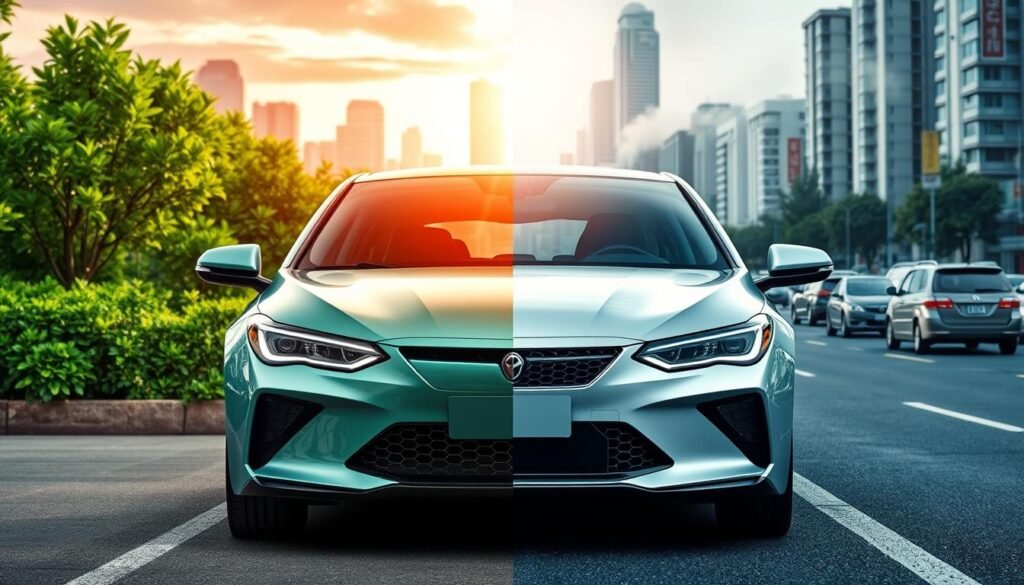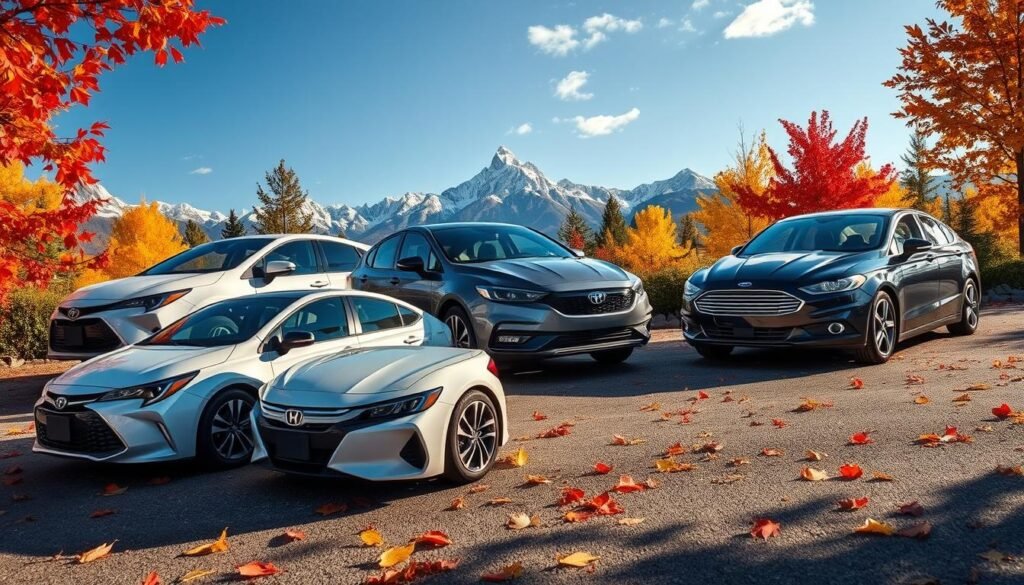Did you know that hybrid cars can achieve up to 50% better fuel efficiency than their conventional counterparts? This remarkable advantage has led to a surge in Canadian drivers opting for hybrid vehicles. They seek a balance between performance and sustainability. This guide delves into hybrid technology, explaining what hybrid cars are, the various types available, and their numerous benefits. As the automotive landscape evolves, understanding these vehicles is essential for making informed choices. These choices not only meet individual needs but also contribute to a more sustainable future. Join us as we explore the world of hybrid cars and discover how they can transform your driving experience. For a deeper understanding, check out this ultimate guide on hybrid vehicles.
Key Takeaways
- Hybrid cars combine traditional engines with electric propulsion for better efficiency.
- There are different types of hybrid vehicles, each catering to unique driving needs.
- The rise in hybrid technology significantly reduces emissions, benefiting the environment.
- Driving a hybrid can lead to substantial cost savings on fuel expenses.
- Understanding hybrids can steer you towards more sustainable vehicle choices.
What Are Hybrid Cars?
Hybrid cars embody a groundbreaking approach to vehicle engineering, merging the potency of an internal combustion engine with the efficiency of an electric motor. These vehicles leverage cutting-edge technology to diminish fuel usage and environmental impact. The integration of both power sources fosters a hybrid powertrain that maximizes performance and efficiency.
Definition of Hybrid Vehicles
Hybrid vehicles are characterized as automobiles equipped with both conventional gasoline engines and electric motors. This dual setup enables drivers to harness the advantages of both systems. Hybrid engines function by smoothly transitioning between electric and gasoline power or employing both concurrently, thereby boosting fuel economy and curtailing emissions.
How Hybrid Cars Work
The operation of hybrid cars hinges on a sophisticated hybrid drivetrain, engineered for optimal efficiency. At the outset or during low-speed operation, the electric motor predominates. However, as the need for increased power or speed arises, the gasoline engine engages, augmenting the vehicle’s performance. This strategic coordination minimizes energy loss and significantly reduces the vehicle’s carbon footprint.
Types of Hybrid Cars
Hybrid cars present a variety of options, each catering to eco-aware drivers and those aiming for better fuel efficiency. Identifying the right hybrid electric vehicle is crucial. We delve into the primary hybrid models available today.
Full Hybrid Vehicles
Full hybrids can run on either the gasoline engine or the electric motor alone. This flexibility enhances fuel economy and reduces emissions. Ideal for city driving, they seamlessly switch between power sources. The Toyota Prius and Ford Fusion Hybrid stand out as exemplary models.
Mild Hybrid Vehicles
Mild hybrids use an electric motor to augment the gasoline engine but cannot run solely on electric power. They improve fuel efficiency by providing extra energy during acceleration. This integration leads to a smoother ride and cost savings over time.
Plug-in Hybrid Vehicles
Plug-in hybrids can be charged from an external source, significantly extending their electric range. This capability enables drivers to complete shorter trips using only electric power. Once the battery depletes, they function like conventional hybrids. The Chevrolet Volt and Toyota RAV4 Prime are well-known in this category.
Range-Extended Electric Vehicles
Range-extended electric vehicles primarily operate on electric power but have a small gasoline engine to recharge the battery when needed. This setup alleviates range anxiety while offering electric vehicle benefits. The BMW i3 with Rex exemplifies this hybrid model.
Benefits of Driving Hybrid Cars
Driving hybrid cars offers numerous advantages, appealing to those who prioritize environmental sustainability and cost-effectiveness. As more people become aware of hybrid technology, they are increasingly drawn to these vehicles for their daily commute. This shift reflects a growing recognition of the benefits these cars provide.
Fuel Efficiency
Hybrid cars stand out for their exceptional fuel efficiency. They outperform conventional cars, thanks to the synergy between a gasoline engine and an electric motor. This combination optimizes fuel usage, reducing the need for frequent refueling.
Lower Emissions
Hybrid technology significantly reduces harmful emissions. By utilizing both electric and gasoline engines, hybrids emit fewer greenhouse gases than traditional vehicles. This reduction in emissions contributes to cleaner air and supports global efforts to combat climate change, making hybrids a responsible choice.
Cost Savings on Fuel
With fuel prices on the rise, owning a hybrid car offers substantial financial benefits. The lower fuel consumption results in considerable savings over time. This investment in hybrid technology can lead to reduced monthly fuel expenses, allowing drivers to allocate those savings to other critical needs. For legal guidance on vehicle ownership, this resource may be useful.
Resale Value
Hybrid cars also offer an economic advantage in terms of resale value. Their increasing popularity and demand contribute to their ability to retain value over time. When it’s time to sell or trade in, owners often find that their hybrid vehicle commands a higher price than traditional cars. This further enhances the long-term savings associated with hybrid technology.
Comparing Hybrid Cars to Conventional Cars

When considering hybrid cars versus conventional cars, several critical factors emerge. This comparison sheds light on performance disparities, environmental effects, and potential cost benefits. It offers a comprehensive view for those contemplating a purchase.
Performance Differences
Hybrid cars provide a unique driving experience compared to conventional cars. Many drivers value the quieter operation of hybrids, enhancing ride comfort. Hybrids combine electric and gasoline power for smooth acceleration, unlike conventional cars, which rely solely on combustion engines. This results in less noise and vibrations.
Environmental Impact
Hybrid cars play a significant role in environmental conservation. They emit fewer greenhouse gases than conventional cars, which depend solely on fossil fuels. This makes hybrids a preferred choice for those concerned about the environment.
Potential Cost Savings
Choosing hybrid cars can result in substantial long-term cost savings. Their higher fuel efficiency means lower gasoline expenses. These savings are particularly significant for those with long commutes. Furthermore, manufacturers often provide warranties and incentives for hybrid maintenance, reducing unexpected costs compared to conventional cars.
The Evolution of Hybrid Cars
The journey of hybrid vehicles predates the recent surge in popularity. Hybrid technology’s roots extend back to the early 20th century, combining internal combustion and electric power. This evolution showcases significant advancements, shaping the modern hybrid car seen on roads today.
Historical Background
Ferdinand Porsche introduced the Lohner-Porsche Mixte in 1899, one of the first hybrid cars, utilizing both gasoline and electric power. The automotive industry’s progression saw these innovations set aside until the late 20th century. This was due to environmental concerns and oil crises. The modern era of hybrid vehicles began with the 1997 launch of the Toyota Prius in Japan, marking the mass-market acceptance of hybrid technology.
Major Milestones in Hybrid Development
Several key milestones have significantly influenced hybrid technology’s direction:
- The introduction of the Honda Insight in 1999, marking the first hybrid vehicle sold in North America.
- The launch of the second-generation Toyota Prius in 2003, offering improved design and efficiency, further popularizing hybrid vehicles globally.
- The expansion of hybrid offerings from various manufacturers, including luxury brands like Lexus, demonstrating that hybrid technology serves both economy and performance.
- Recent advancements in battery technology leading to enhanced performance and range, making hybrid cars more appealing to a broader audience.
As hybrid vehicles continue to evolve, they embody a commitment to sustainability without compromising the driving experience. This progress signals a bright future for hybrid technology in the automotive landscape.
Popular Hybrid Car Models in Canada

Hybrid cars have seen a surge in popularity in Canada, with several models leading the way. These vehicles are celebrated for their efficiency and appeal. Here, we explore the top hybrid models that are capturing the attention of Canadian drivers.
Toyota Prius
The Toyota Prius is a pioneer in the hybrid car market, known for its outstanding fuel efficiency and innovative design. Its aerodynamic shape and advanced technology have set a benchmark for hybrid models. Canadian consumers value the Prius for its environmental benefits, reliability, and spacious interior.
Honda Insight
The Honda Insight is another standout, blending style with performance. It has garnered praise for its sleek design and user-friendly features, making it a favorite among city dwellers. The Insight is equipped with cutting-edge technology, ensuring a comfortable ride and impressive fuel efficiency.
Ford Escape Hybrid
The Ford Escape Hybrid is ideal for those seeking versatility. This hybrid SUV combines spaciousness and off-road capability with the eco-friendliness of hybrid technology. Canadian families often opt for the Escape Hybrid due to its ample cargo space and modern safety features.
Lexus RX Hybrid
The Lexus RX Hybrid offers a luxurious take on hybrid cars. It is renowned for its exceptional comfort and high-end features, appealing to those who desire a premium driving experience. The RX Hybrid provides the power needed for an exhilarating drive while keeping emissions low, making it perfect for those who value both comfort and environmental responsibility.
Each of these hybrid models offers something unique, catering to diverse Canadian driving needs. Whether you prioritize fuel efficiency, style, or luxury, there is a hybrid car to suit your preferences. For more insights on automotive options, our comprehensive guide on local car accident lawyers in Canada may be helpful.
Costs Associated with Hybrid Cars
Prospective buyers must grasp the financial implications of hybrid cars. Costs vary due to purchase price, maintenance, and insurance. This section delves into these factors to aid in informed decision-making.
Purchase Price
The initial cost of hybrid cars reflects their advanced technology. Although they may have a higher starting price than traditional models, long-term savings on fuel and maintenance can balance this. Many see the initial investment as worthwhile for the long-term benefits.
Maintenance Costs
Maintenance for hybrid cars is typically less expensive than for conventional vehicles. The complexity of hybrid systems leads to fewer repairs, saving money over time. Regular maintenance, like battery checks and fluid replacements, is crucial but usually doesn’t exceed traditional costs.
Insurance Considerations
Insurance for hybrid cars often comes with lower premiums due to their safety features and lower accident risks. Many insurers offer discounts for hybrid owners, acknowledging their safer driving and environmental commitment. It’s wise to compare rates and consult with providers to find the best hybrid insurance deals.
Incentives for Buying Hybrid Cars

For Canadians eyeing hybrid cars, financial assistance can greatly alleviate the cost. Various incentives are available at both the federal and provincial levels, aimed at boosting the adoption of eco-friendly vehicles. These incentives, including government rebates and tax credits, can make hybrid ownership more feasible.
Government Rebates
The Canadian government extends several rebates to encourage the use of hybrid cars. These rebates act as a substantial financial incentive for those choosing eco-friendly vehicles. By leveraging these programs, buyers can significantly lower their costs of responsible vehicle ownership.
Provincial Incentives
Each province offers its own set of incentives for hybrid cars, tailored to their specific needs. These incentives differ in amount and eligibility, reflecting the unique priorities of each region. Familiarizing oneself with these options can lead to additional savings when purchasing a hybrid.
Tax Credits
Tax credits for hybrid vehicle owners offer another avenue for financial relief. Claiming these credits on annual tax returns can help offset the costs of hybrid cars. This makes transitioning to greener transportation more appealing financially.
How to Choose the Right Hybrid Car
Choosing the ideal hybrid vehicle necessitates a thorough examination of several factors. Many individuals fail to consider their specific driving requirements, which are crucial in identifying the most suitable hybrid car. This meticulous approach can significantly improve both comfort and overall satisfaction with the purchase.
Assessing Your Driving Needs
Start by analyzing your driving habits. Key aspects to consider include:
- Daily commute distance
- Frequency of long trips
- Typical passenger and cargo requirements
By understanding these elements, you can pinpoint the hybrid model that best fits your lifestyle. This ensures you maximize the benefits of the vehicle’s features.
Researching Model Reviews
Engaging in online research is vital. Seek out credible reviews from automotive experts and user experiences. Focus on:
- Performance ratings
- Fuel efficiency comparisons
- Maintenance feedback
This research will empower you to make well-informed decisions. It helps in selecting hybrid cars that align with your preferences and requirements.
Test Driving Options
Once you’ve narrowed your options, schedule test drives at dealerships. Directly experiencing different hybrid vehicles allows you to evaluate their comfort, handling, and features. Pay attention to:
- Driving feel and responsiveness
- Interior comfort and technology
- Visibility and parking ease
The test drive experience is instrumental in shaping your final decision. It ensures you select a hybrid vehicle that meets your expectations.
Common Myths About Hybrid Cars
Hybrid cars are often shrouded in misconceptions that can deter potential buyers. It is crucial to debunk these myths and reveal the genuine advantages of hybrid vehicles.
Misconceptions About Fuel Savings
Many believe hybrid cars do not offer substantial fuel savings. However, research shows hybrids generally achieve higher fuel efficiency, especially in urban settings. Their electric motor significantly cuts down fuel use, leading to long-term cost benefits for drivers.
Concerns Regarding Battery Lifespan
There are worries about hybrid battery longevity. Modern hybrids boast batteries designed to endure over 150,000 miles. Manufacturers back these batteries with warranties from 8 to 10 years, alleviating concerns about the investment in hybrid vehicles.
Performance Myths
Another prevalent myth is that hybrids lack power and performance. This is not accurate. Contemporary hybrids provide impressive acceleration and power, often rivaling or surpassing traditional gasoline cars. With ongoing technological advancements, hybrids offer a thrilling drive while maintaining their fuel efficiency.
Maintenance Tips for Hybrid Owners
Hybrid cars offer numerous benefits, yet they necessitate particular maintenance routines to guarantee their longevity and optimal performance. Adherence to these maintenance tips is crucial for ensuring your vehicle operates at its peak efficiency.
Routine Maintenance Checklist
Consistent upkeep is paramount for hybrid cars. Adhering to a meticulous maintenance checklist is vital for early detection of potential issues. Here’s a straightforward routine to adhere to:
- Regular oil changes, typically every 5,000 to 7,500 miles.
- Tire rotations every 6,000 to 8,000 miles to promote even wear.
- Brake inspections to ensure proper functionality, especially with regenerative systems.
- Inspecting the cooling system and replacing coolant as needed.
Battery Care and Replacement
The hybrid battery is a critical component of these vehicles. Proper care can extend its lifespan. Look for signs such as:
- Reduced driving range.
- Warning lights on the dashboard.
- Unusual noises during operation.
To prolong battery life, keep the vehicle away from extreme temperatures and charge it regularly. Scheduled inspections can also help identify issues before they escalate.
Finding a Qualified Mechanic
Proper care of hybrid cars often requires specialized knowledge. Seek a mechanic with experience in hybrid technology to ensure the right service. Recommendations from fellow hybrid owners or reading reviews can greatly assist in selecting a qualified professional. Regular check-ups with an expert will help maintain your vehicle’s efficiency and performance.
Future of Hybrid Technology
The automotive sector is undergoing a transformation, with hybrid technology at its forefront. Innovations in this area aim to boost efficiency and performance while minimizing environmental impact. Hybrid cars are pivotal in this shift, serving as a bridge to a more sustainable automotive future.
Upcoming Innovations
Advancements in battery efficiency are a key focus for hybrid technology. Efforts are underway to create batteries that charge swiftly and endure longer, enhancing hybrid appeal. Additionally, the introduction of lighter materials in vehicle designs is expected to significantly boost fuel economy without compromising safety.
Trends in the Automotive Industry
The automotive industry is rapidly moving toward electric vehicles, driven by environmental standards and consumer demand. Hybrid technology is seen as a crucial stepping stone toward fully electric vehicles. This transition aims to harmonize performance with sustainability, meeting regulatory requirements.
The Shift Toward Electric Vehicles
Despite the growing momentum for electric vehicles, hybrid cars remain essential during this transition. They offer enhanced fuel efficiency and lower emissions than traditional gasoline vehicles. This makes them a key part of the strategy to reduce fossil fuel dependence as electric infrastructure improves. For deeper insights into this evolving landscape, explore this link.
As consumers weigh their choices, hybrid technology will remain a dependable option amidst ongoing innovations. With manufacturers continually refining their offerings, hybrid systems are expected to become increasingly advanced. The coming years will redefine the industry, promoting a sustainable transportation model, including improved hybrid models. For more details on hybrid deals, visit this link.
Conclusion: Embracing Hybrids for a Sustainable Future
The transition to hybrid cars marks a critical milestone on the path to a sustainable future. These vehicles boast remarkable fuel efficiency, drastically reduced emissions, and considerable cost benefits for drivers. By integrating electric and conventional engines, hybrids serve as more than just a choice for environmentally aware consumers. They are instrumental in lowering carbon footprints, thereby enhancing air quality in cities.
Recap of Benefits
This guide has highlighted the extensive advantages of hybrid cars, transcending mere convenience. They offer an eco-friendly option without compromising on performance, appealing to a wide range of drivers. Moreover, the financial incentives in Canada make switching to hybrids even more attractive. Adopting this technology not only leads to personal financial gains but also promotes environmental sustainability.
Encouraging Adoption in Canada
In Canada, hybrid cars stand out as a compelling choice for those in the market for a new vehicle. By opting for these eco-friendly alternatives, we collectively advance towards a more sustainable future. As awareness of hybrid technology’s benefits grows, the shift from traditional fossil fuel vehicles will gain momentum. This will pave the way for a cleaner, greener Canada. The journey towards a greener future is promising, with each step towards hybrid adoption bringing us closer to environmental milestones.
